17 Words to Describe the Moon and Stars
Looking for great words to describe the moon and stars in your current WIP? Luckily, there are plenty of awesome (completely non-boring!) options out there for you.
Whether you’re looking to enchant your audience, or you want them to vividly picture the night sky, these are some of the best words to describe the moon and stars out there… without going overboard.
Give your writing an artful glow-up with some new illuminating words. Which will you try out next?
Words to Describe the Moon and Stars
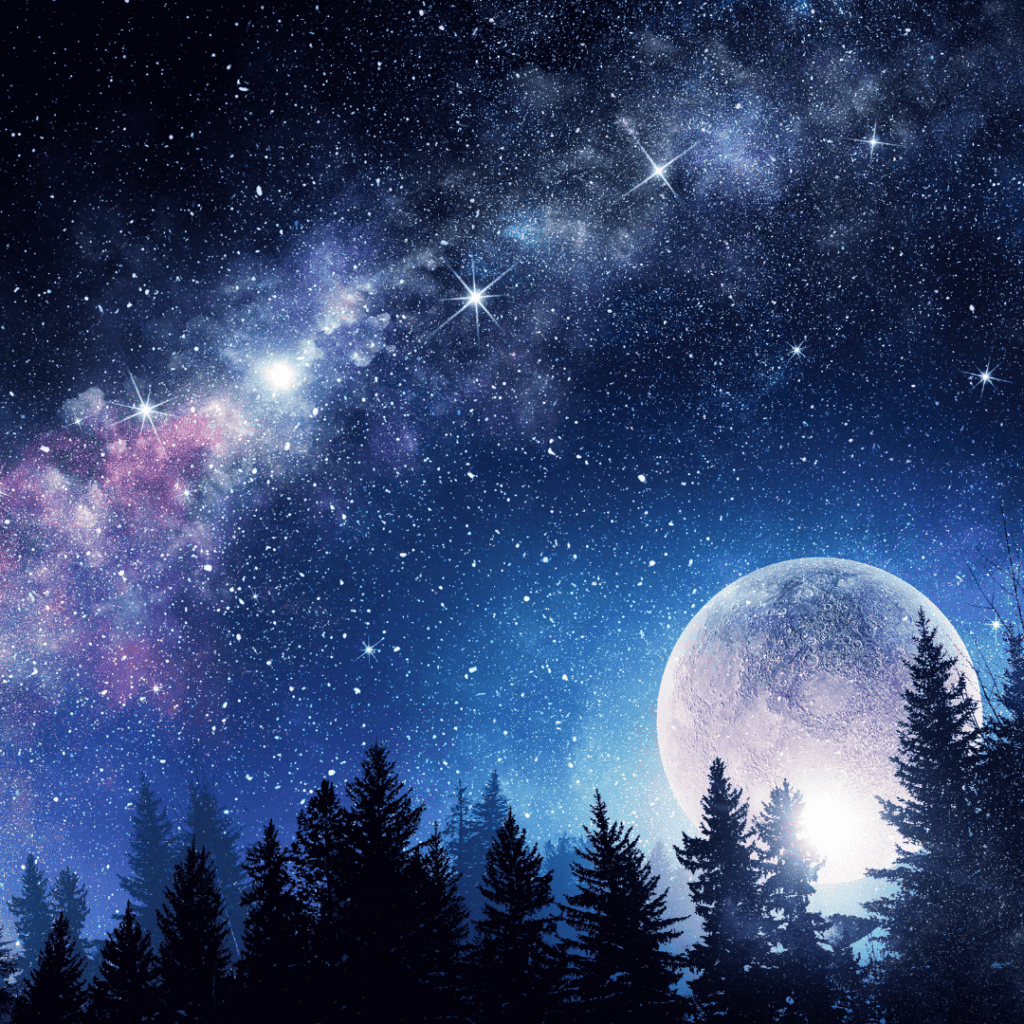
1. Luminous
The word “luminous” adds a sense of brightness and clarity, creating a vivid image of light in darkness.
It helps paint a picture that stands out sharply against the night sky, emphasizing the beauty and presence of the moon or stars in a scene. It conveys an almost magical quality to the light, making the scene more enchanting.
I LOVE the word luminous for a fantasy setting, but it truly works in ANY genre.
Definition: Emitting or reflecting light, especially in the dark.
Examples:
- The luminous moon cast a gentle glow over the landscape.
- Her eyes were luminous, reflecting the starlight.
2. Ethereal
Another great fantasy word is ethereal.
It conveys a sense of fragility and otherworldliness, enhancing the mystical quality of the scene. It suggests something that is almost unreal, elevating the description to a level that feels dreamlike or supernatural.
This word is perfect for creating a sense of wonder and awe, giving the night sky a magical feel.
Definition: Extremely delicate and light in a way that seems too perfect for this world.
Examples:
- The ethereal glow of the stars made the night sky look otherworldly.
- She moved with an ethereal grace under the moonlight.
3. Celestial
Celestial emphasizes the connection to the heavens, adding a grand, awe-inspiring dimension to the description.
This is a great word that connects the reader to the vastness and mystery of the universe, making the stars and moon feel majestic and significant.
This word brings a sense of scale and importance, enhancing the overall impact of the scene.
Definition: Positioned in or relating to the sky, or outer space as observed in astronomy.
Examples:
- The celestial bodies moved in their silent dance across the sky.
- He gazed at the celestial wonders, feeling a sense of awe.
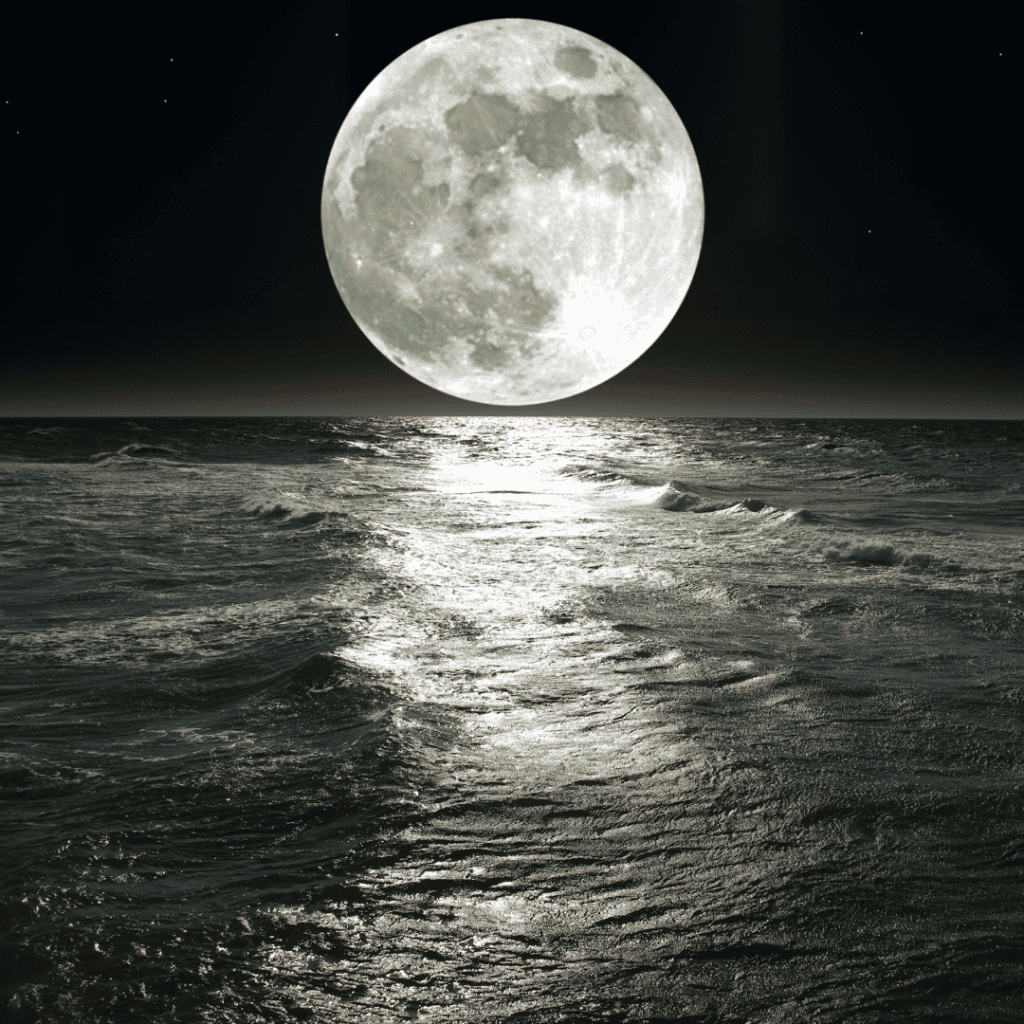
4. Radiant
Radiant highlights intense brightness and beauty, making the imagery more vivid and striking.
It’s a word that suggests a powerful and captivating light that draws the reader’s attention. It enhances the visual appeal of the scene, making the moon and stars appear vibrant and full of life.
Definition: Sending out light; shining or glowing brightly.
Examples:
- The radiant moon illuminated the dark forest.
- Stars appeared as radiant jewels scattered across the sky.
5. Twinkling
Twinkling suggests movement and liveliness, adding dynamic energy to the description.
It captures the small, rapid changes in light that make stars seem to shimmer. This word brings a playful and enchanting quality to the scene, making the stars feel more interactive and engaging.
Definition: Shining with a flickering or sparkling light.
Examples:
- The twinkling stars created a beautiful tapestry in the night sky.
- Her eyes were twinkling with excitement, like the stars above.
6. Silvery
Silvery adds a metallic, reflective quality, enhancing the elegance and refinement of the scene.
It suggests a cool, clean light that is both beautiful and sophisticated. This word helps to create a sense of purity and serenity, making the moon and stars appear graceful and delicate.
Definition: Having a white, gray, or pale appearance; shining like silver.
Examples:
- The silvery light of the moon reflected off the calm waters.
- Her hair shimmered with a silvery sheen under the starlight.
7. Gleaming
Gleaming suggests a clean, polished brightness, adding a sense of purity and sharpness to the imagery.
It conveys a strong, steady light that stands out clearly against the darkness. This word enhances the visual impact of the scene, making the moon and stars appear crisp and well-defined.
Definition: Shining brightly, especially with reflected light.
Examples:
- The gleaming stars were like diamonds scattered across the sky.
- The moon’s gleaming surface shone with a soft brilliance.
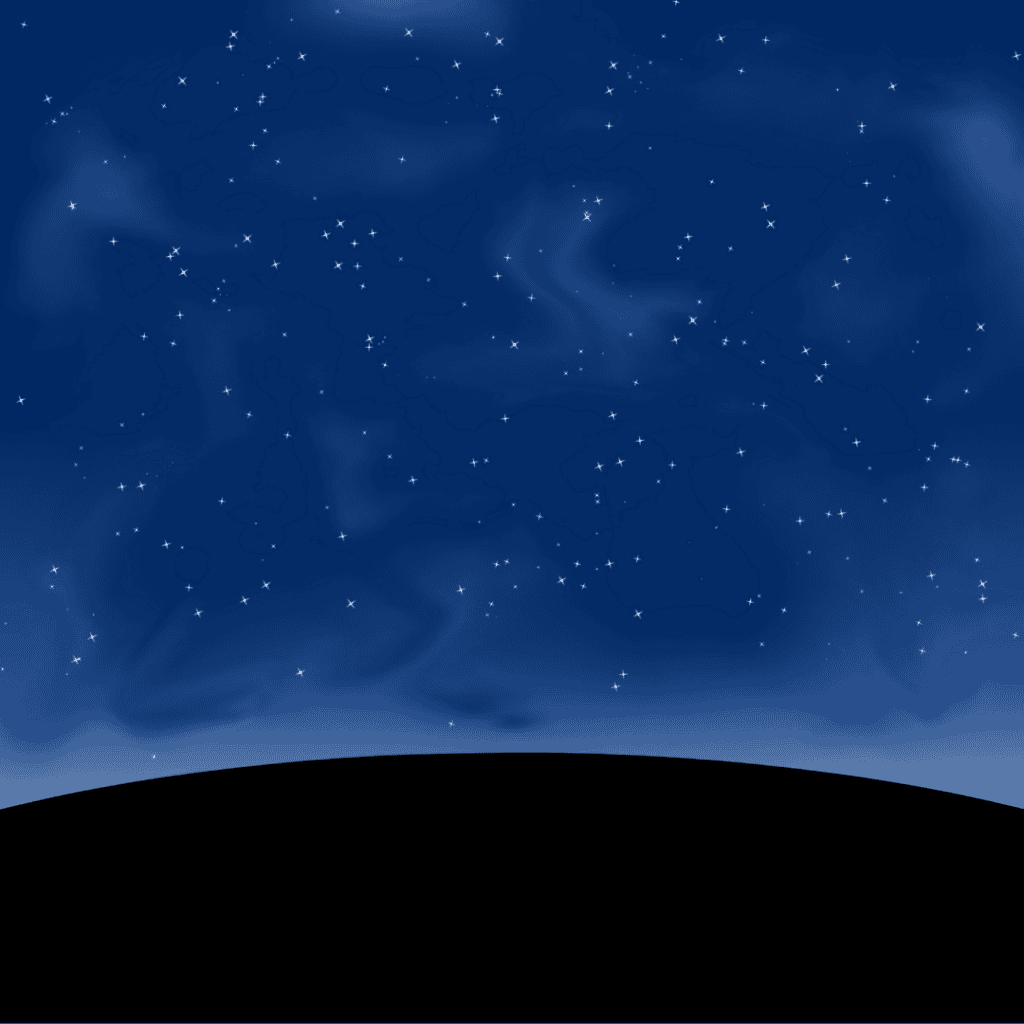
8. Astral
Astral directly connects to stars, adding a scientific yet poetic dimension to the description.
It suggests a deep connection to the cosmos, making the scene feel more expansive and profound. This word enhances the sense of wonder and curiosity about the universe, adding depth to the imagery.
Definition: Relating to or resembling the stars.
Examples:
- The astral light of the stars guided their way through the night.
- He was fascinated by the astral phenomena visible in the sky.
9. Nocturnal
Nocturnal emphasizes nighttime activity, enhancing the sense of life and mystery during the night.
It suggests a world that comes alive after dark, adding an element of intrigue and fascination. This word helps to create a rich, immersive atmosphere, making the night feel vibrant and full of hidden wonders.
Definition: Active at night; relating to or occurring in the night.
Examples:
- The nocturnal beauty of the sky captivated her.
- Nocturnal creatures moved silently under the moon and stars.
10. Serene
Serene conveys calmness and tranquillity, creating a soothing and peaceful atmosphere.
It suggests a quiet, undisturbed scene that invites reflection and relaxation. This word helps to evoke a sense of harmony and balance, making the night feel like a sanctuary from the chaos of the day.
Definition: Calm, peaceful, and untroubled; tranquil.
Examples:
- The serene night was perfect for stargazing.
- Under the serene light of the moon, she found peace.
11. Mystical
Mystical adds a sense of wonder and enchantment, enriching the scene with a magical quality.
It suggests a deeper, spiritual connection to the night sky, making the stars and moon feel mysterious and profound. This word enhances the emotional impact of the scene, making it feel more powerful and captivating.
Definition: Relating to mystics or religious mysticism; inspiring a sense of spiritual mystery, awe, and fascination.
Examples:
- The mystical glow of the moon made the night feel enchanted.
- Stars held a mystical allure, drawing her into their depths.
12. Phosphorescent
Phosphorescent suggests a soft, glowing light, enhancing the mysterious and almost supernatural feel of the scene.
It conveys a light that is gentle and otherworldly, adding a sense of quiet magic. This word helps to create a haunting, ethereal atmosphere, making the night feel enchanted and strange.
Definition: Emitting light without heat.
Examples:
- The phosphorescent glow of the moon gave the landscape an eerie beauty.
- Stars appeared almost phosphorescent against the dark sky.
13. Starlit
Starlit directly references the stars as the source of light, creating a clear and enchanting visual. It suggests a scene that is bathed in the soft, gentle light of the stars, adding a sense of romance and beauty. This word helps to evoke a feeling of intimacy and wonder, making the night feel magical and serene.
Definition: Illuminated by stars.
Examples:
- They walked along the starlit path, guided by the heavens above.
- The starlit sky was a canvas of endless wonder.
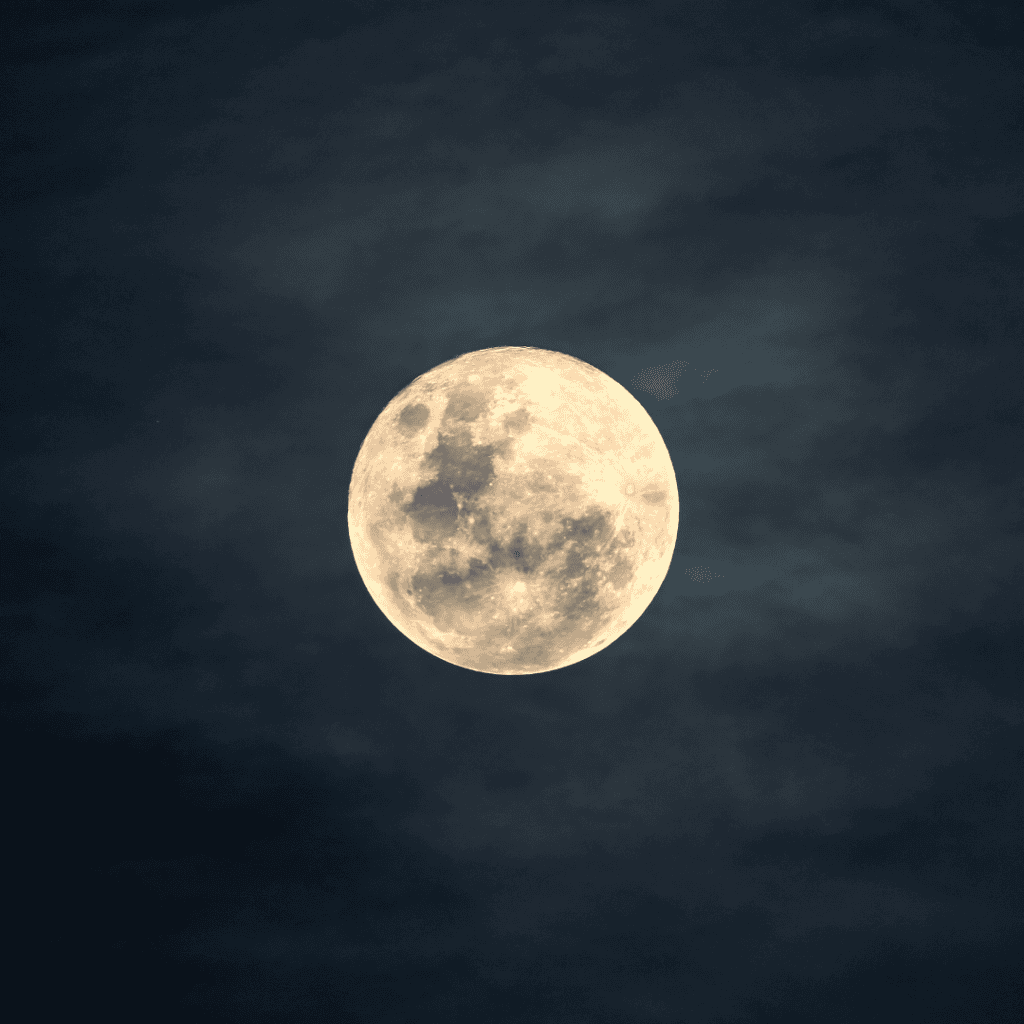
14. Moonlit
Moonlit specifically highlights the moon’s light, adding a romantic and serene quality to the scene.
It suggests a soft, gentle illumination that creates a peaceful and dreamy atmosphere. This word helps to evoke a sense of calm and tranquility, making the night feel soothing and intimate.
Definition: Illuminated by the moon.
Examples:
- The moonlit night cast long shadows on the ground.
- Her face was moonlit, serene and beautiful.
15. Nebulous
Nebulous conveys a hazy, dreamlike quality, adding depth and a sense of vastness to the description.
It suggests a scene that is soft and indistinct, creating a feeling of mystery and wonder. This word helps to evoke a sense of the unknown and the infinite, making the night sky feel boundless and full of possibilities.
Definition: In the form of a cloud or haze; hazy, relating to a nebula or nebulae.
Examples:
- The nebulous glow of distant stars created a soft, dreamy sky.
- Her thoughts were as nebulous as the milky way above.
16. Aglow
Aglow adds warmth and vibrancy to the description, enhancing the visual impact of the scene.
It suggests a light that is rich and full of color, creating a lively and enchanting atmosphere. This word helps to evoke a sense of joy and wonder, making the night feel vibrant and alive.
Definition: Glowing with light or color.
Examples:
- The moon was aglow with a soft, golden light.
- Stars set the sky aglow, creating a magical nightscape.
17. Shimmery
Shimmery suggests a delicate, flickering light, adding a sense of movement and elegance to the imagery.
It conveys a light that is playful and dynamic, creating a scene that feels lively and magical. This word helps to evoke a sense of beauty and grace, making the night feel enchanting and full of wonder.
Definition: Shining with a tremulous or flickering light.
Examples:
- The shimmery light of the stars danced on the waves.
- Her dress was shimmery, reflecting the moon’s glow.
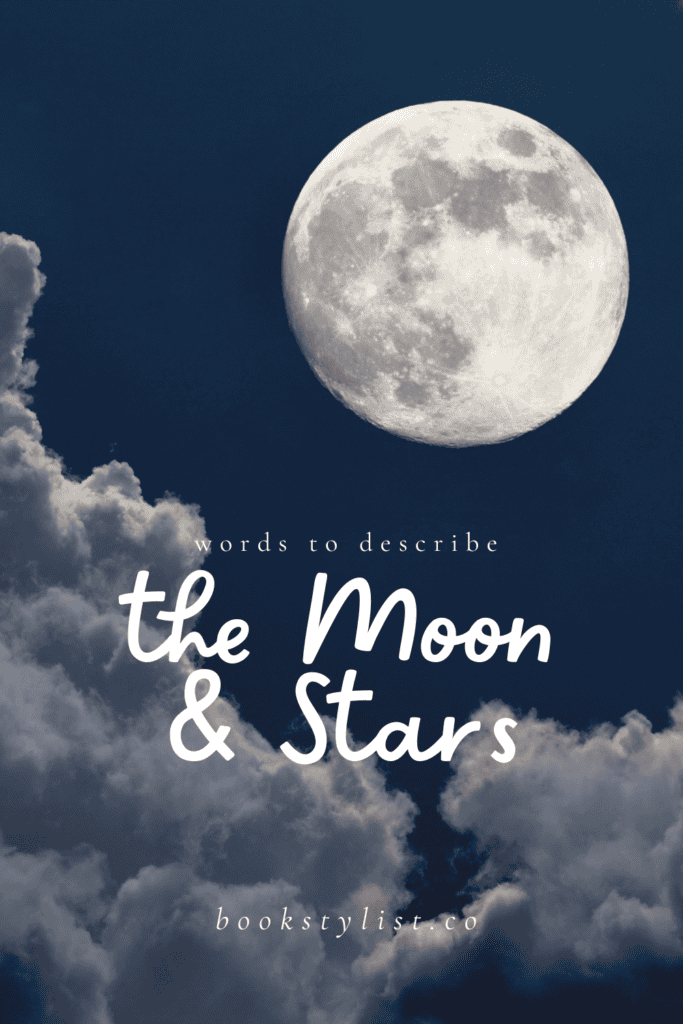
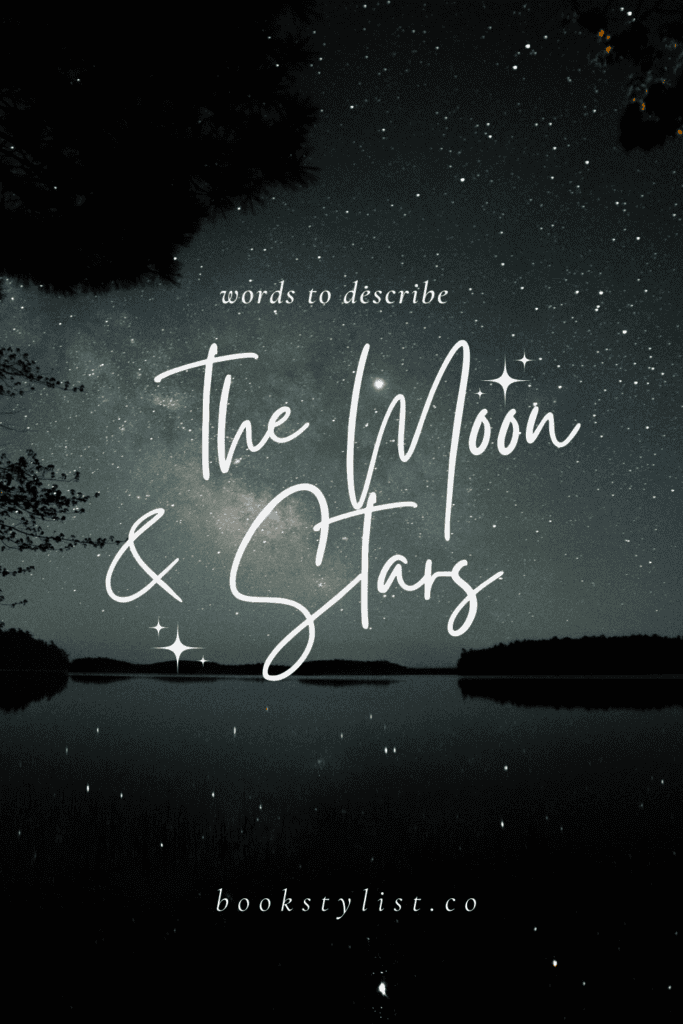
Final Thoughts: Words to Describe the Moon
The English language is full of gorgeous words you can use to convey greater emotion and meaning within your writing. These are a mere few words to describe the moon and stars while illustrating an immaculate scene in your reader’s mind.
Whether you want to stress the overall feel of the night, hint at the light that’s available for your characters or add a little sparkle to your writing, these are some great options to pick from.